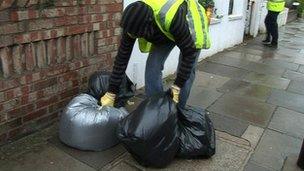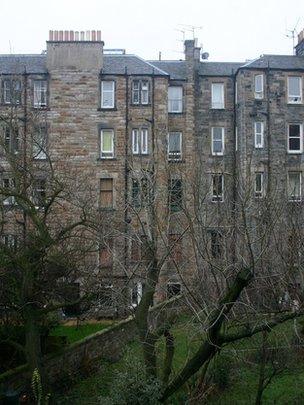Scottish independence: Institute of Fiscal Studies urges council tax re-think
- Published

Council tax goes to pay for services such as refuse collections
A think tank has advised the Scottish government to carry out a radical reform of council tax.
The Institute of Fiscal Studies (IFS) recommendation appeared in a study of options for an independent Scotland.
It believed that post Yes, Scotland could make bold moves to improve the way the tax system was run.
But it warned that different tax systems across the border could lead to a cut in tax revenue due to competition between governments.
As a result, the IFS said there would be pressure to put more weight on property taxes, as they are harder to avoid.
But it says "the failure of the Scottish government to introduce difficult but much-needed reforms where it has had autonomy - notably the failure to revalue properties for council tax purposes - does not bode well" for reform.

Council tax in Scotland is based on valuations from 1991
The people of Scotland go to the polls in September next year to vote in an independence referendum. They will be asked the straight "yes/no" question: "Should Scotland be an independent country?"
Council tax is based on valuations from 1991. It has been frozen since 2007 and it gives an incentive to single people to remain in larger homes than they need.
It is also regressive, in that people in more valuable homes pay a smaller share of their homes' value than those in lower-cost homes.
Property on similar valuations of homes are now 20% lower in Scotland than in England, due to the sustained freeze on council tax since the SNP came to power.
The IFS recommended to the UK and Scottish governments that a property tax should be levied on the value of the home, which would be more progressive.
It also suggested abolition of stamp duty, saying there was no value to taxing people when they buy property. It has argued that the same tax revenue could be raised instead from annual taxation on home ownership.
The Scottish government has legislated for a newly-devolved power to tax property transactions, but it is only making limited changes to the system that has applied across the UK.
The wide-ranging report suggested Scotland's different circumstances could mean a cut in motoring taxes, as there was less need to tackle congestion than in England.
It also looked in detail at SNP ministers' intention to cut corporation tax, levied on company profits.
It said First Minister Alex Salmond's claims that this could help create jobs and boost economic growth were "highly speculative".
The SNP had claimed that cutting corporation tax to three percentage points below that of the rest of the UK (rUK) could create 27,000 jobs and raise economic output by 1%.
The IFS analysis responds that calculation required "strong assumptions and a large dose of guesswork".
It said at the moment there was "little way of knowing" how much additional investment a lower rate of corporation tax would bring to to the country.
The independent think-tank concluded if Scotland were to leave the UK, it could face fiscal pressures at least as strong as the rest of the UK and may want to consider increasing taxes.
It confirmed previous IFS research showing the finance minister of an independent Scotland would have to find £2.5bn of tax rises or spending cuts in the first two years after achieving independence.
If oil revenues fall away as fast as forecast by the Office for Budget Responsibility (though these forecasts are contested), there would be an additional £3.4bn gap in the budget.
It went on to state that a one percentage point increase in either the main rate of VAT, or in both the basic and higher rates of income tax, would raise around £430m north of the border.
The IFS added there would be "challenges for the new Scottish tax system", highlighting the ability of people or businesses to switch tax bases over the border as the "key new challenge" leaving the UK would bring.
The leader of Better Together, Alistair Darling, said that unless the Scottish government's independence White Paper - due to be published on 26 November - dealt "honestly" with the challenges facing an independent Scotland then it would not have any credibility.
The former Labour chancellor said: "Alex Salmond will say and promise anything to get us to vote for independence, but the experts say it would come at a cost.
"These reports [from the Institute for Fiscal Studies and the Centre for Public Policy Regions] confirm what SNP Ministers know to be true in private but won't admit in public. Billions of pounds worth of cuts would be needed just to stand still.
"Today we have the best of both worlds where we pool our resources and share the burden. As these reports make clear, it will be Scotland's pensioners and the most vulnerable people in our country who will be left to pick up the tab for Alex Salmond's obsession with independence. Is this really a price worth paying?"
A Scottish government spokeswoman said the IFS report confirmed that Scotland was in a relatively stronger fiscal position, with higher tax receipts per person than the rest of the UK as a whole.
She added: "The IFS say independence would give Scotland an opportunity to design a much more efficient tax system than the current UK system. The Fiscal Commission Working Group will shortly publish a report on the principles of a modern and effective tax system, highlighting the opportunities to design a system which reflects the needs and characteristics of Scotland, its people and its businesses."